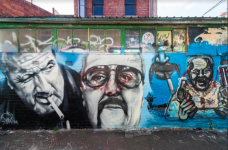The Top Five Australian Crime Films

Australian cinema has a long history of producing raw and brutal films. And none more so, than those that explore criminal conduct. It could even be said that the outlaw defines the zeitgeist of our colonial times.
Perhaps part of the fascination stems from the fact that when the British stormed in to begin their occupation of this land 230 years ago, the cargo they were carrying was made up of convicts.
The occupiers were set to turn the area known today as Sydney into a vast prison camp. Indeed, some of the acts perpetrated on Antipodean screens might be seen as a reflection of the inhumanity inflicted upon the continent’s First Nations peoples.
So, let’s take a look at five standout lawbreaker films that have left their undeniable mark on the Australian motion picture industry.
-
Stone
Released in 1974, Stone follows a Sydney police detective of the same name, as he goes undercover with outlaw motorcycle gang the Gravediggers. Stone poses as a bikie, while he investigates who’s been knocking off members of the gang.
The movie is a series of strung together scenes that portray the denim-clad, Satanist renegades brawling with a rival gang, racing Kawasaki bikes, and smoking pot. However, all the while, these suburban bandits are actually wreaking havoc on the streets of Sydney’s lower North Shore.
But, despite their well-to-do surroundings, the Gravediggers are living by their own outcast code. As gang leader, the Undertaker, tells the undercover detective, “All law is based on violence. Any cat that breaks the law gets clobbered. Only difference is our law only applies to us.”
And Stone learns this the hard way. After the bikie gang capture the gunman who’s been killing their members, the undercover cop prevents them from finishing him off.
So, to thank Stone for getting in their way, the gang members breakdown the policeman’s front door and beat him senseless in the final scene.
-
Chopper
Uncle Chop Chop is everybody’s favourite homicidal maniac. The 2000 cinema classic Chopper tracks the life of Melbourne’s notorious standover man Mark Brandon Read, who once bragged that he’d killed 19 people, but was only ever charged with one murder, which he was ultimately acquitted of.
The film opens in the gloomy 1978 H Division of Pentridge prison, where Chopper knifes Keithy George in the neck, his best mate Jimmy stabs the thug repeatedly in front, and then, Read gets his ears hacked off in a successful attempt to get transferred out of the gaol.
But, throughout these brutalities, Chopper’s sense of humour pervades the violent incidents. And this habit of laughing in the face of horror is nowhere better revealed than in his relationship with long-time associate Neville Bartos, played with great bravado by Vince Colosimo.
Chopper shot Bartos before he was put inside. And on release, Read encounters him in a nightclub, where Bartos tells him he has no ill feelings, as he’s “flying” after the “crime compo” kicked in.
But, Chopper can’t handle the niceties. And in a paranoid moment, he unloads his gun into the air above the crowd in the club.
After he suspects Bartos has been sleeping with his girlfriend, Chopper pays him visit and demands some of the profits from his speed dealing. But, Bartos refuses. So, “the normal guy who likes a bit of torture” shoots Bartos in the hip, and then graciously drives him to the hospital to get patched up.
-
Ghosts of the Civil Dead
One of Australian cinema’s most disturbing films, Ghosts of the Civil Dead is a gruelling piece that takes the viewer through the slow drip of prison life. The scenes take place within Central Industrial Prison, a “new generation” correctional facility isolated in the outback.
The film opens with text displayed on a computer monitor that reveals the maximum security facility, which is designed to house society’s most violent and unmanageable inmates, has been in perpetual lockdown for the past 37 months, due to an outbreak of violence.
And what transpires next is an account of the events that led up to the lockdown.
Director John Hillcoat’s 1988 debut film is a damning critique of the privatisation of prisons, as well as the dehumanising effect correctional institutions have on inmates, who, rather than being rehabilitated, are further criminalised during their incarceration.
As the patchwork narrative unfolds, it becomes apparent that the prison system is designed to provoke the inmates and the guards into greater acts of violence, so that a committee evaluating the prison can recommend that another profitable “super maximum” security facility be built.
“You are creating a lot of angry men is what you are doing. And one day, those men are going to get out,” Ruben, one of the inmates, ominously warns an official inspecting the prison. “And that day, those people out there are going to pay for what you’re doing in here.”
-
Animal Kingdom
The opening credits of Animal Kingdom are a slideshow of black and white armed hold-up photos that set the menacing tone for the film that’s going to take the audience through the unsettling world of a Melbourne crime family.
The 2010 criminal drama, that received accolades around the globe, was based on a 1991 true crime incident that involved the murder of two Victoria police officers. The story begins when Joshua “J” Cody’s mother overdoses, and the teenager calls on the help of his grandmother, Smurf.
The 17-year-old then finds himself living in the midst of the criminal Cody family, who are largely financed via armed robberies. However, of late, the armed hold-up squad are cracking down, and officers murder family friend and key member of the stick-up crew, Baz, in a car park.
Pope, J’s uncle, wants to exact revenge on the police force. So, he and his two brothers set up an ambush in a suburban street that draws two random young officers to investigate an abandoned car parked in the middle of the road. And when they arrive, the Cody brothers shoot them point-blank.
Played by Ben Mendelsohn, Pope is one of the most chilling characters in Australian film. The subsequent police investigation into the murders causes him to begin removing any loose ends that might lead to his conviction. And as the suspense grows, the story unfolds towards a sinister end.
-
Mad Max
Directed by George Miller, Mad Max is a milestone in Australian cinema. The 1979 classic led to a series of sequels, but what makes the original so significant is that it’s set in the not-too-distant future, where the violence and disorder seem just around the corner.
Max Rockatansky, a young Mel Gibson, is a member of the outback highway police, known as the Main Force Patrol (MFP). And of late, an outlaw motorcycle gang, led by the Toecutter and Bubba Zanetti, are terrorising the local population.
In this dystopian world, the rule of law is failing, which is signified by MFP headquarters, which is a series of dilapidated buildings. Above the front gate is a sign that reads “Halls of Justice,” and some of the lettering is beginning to slip out of place.
A further sign that the system is falling apart, is when Max and his fellow officer Goose bring in one of the bikies for an alleged rape. But, when the offender, Johnny the Boy, goes to trial, the witnesses don’t show, and the federal court closes the case, and lets the offender roam free.
After Goose falls foul of the bikie gang, Max no longer sees the point in enforcing the law and ceases to do so. But, after the outlaw bikies run down and kill his wife and child, Max returns to the Halls of Justice to mete out his own brand of law and exact revenge on the transgressors.







